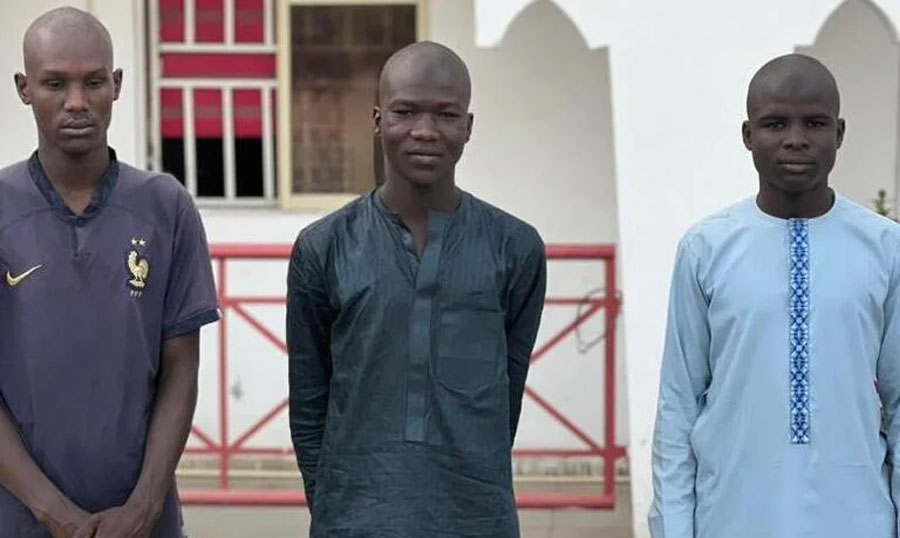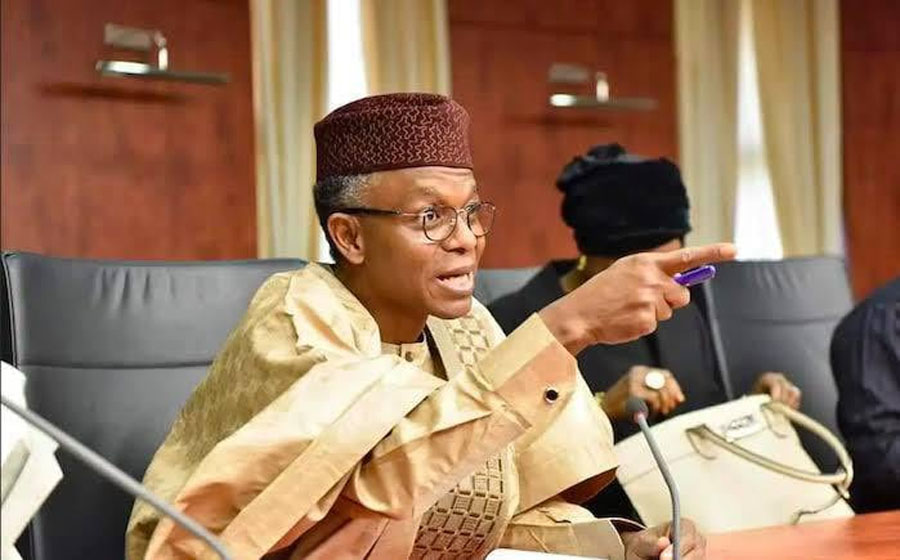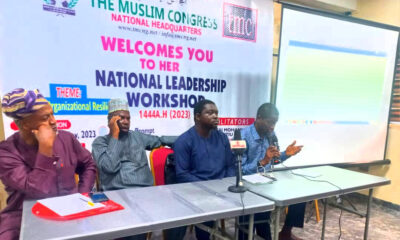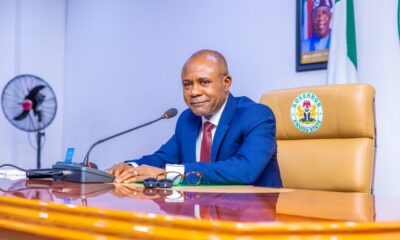metro
Peter Rufai, ex-Eagles goalkeeper, ‘defrauds’ businessman trying to build sports complex

A businessman in Ibadan, Debo Thomas, has narrated how Peter Rufai, a former Nigerian goalkeeper, took his N1 million and denied him value for it.
He also accused Rufai of using his influence within the police to avoid refunding his money.
Thomas said Rufai had promised to help achieve his dream of building a sports complex. A friend connected the duo in 2021, and not long after, they agreed to meet in the latter’s office in Festac, Lagos.
According to Thomas, an elated Rufai accepted the project after their meeting in October 2025.
“He said he wanted to be a part of the project. The way he spoke, it felt like this was something he could do. He said he had done something like that before. He said he had helped Belgium build their sports city,” Thomas told FIJ.
“Rufai said he was going to create a sports city for Lagos but was double-crossed by officials of the state government. He told me not to worry because he had templates. He said he would give me everything he had on the project because he was not all about money.”
READ ALSO:
- Gov. Tambuwal’s aides, others dump PDP for APC
- Power line fire kills 11 in Zaria, many injured, buildings burnt
- CBN bows to pressure, raises cash withdrawal limit to N500,000 weekly
Thomas said he refused to accept a template without a fee because he thought that Rufai must have spent some money on the template and thus should be paid for his effort. Rufai strongly disagreed, saying he would get back to Thomas.
Thomas went his way after the meeting ended, only to receive a call from Rufai that same day, telling him he would like to have a meeting with him the following Monday to discuss a few things.

A copy of the judgement of the court
Thomas said he agreed without hesitation. According to Thomas, he arrived at Rufai’s office before the agreed time of 2 pm, but his host didn’t show up until 4 pm.
“When he arrived, he blamed his delay on the traffic he claimed to have encountered coming from the Republic of Benin. But even if there was gridlock, he did not take our calls. In fact, my team and I met him by the roadside when we were already taking our leave,” he said.
This time, Thomas said, Rufai came with a lady called Mikaila, whom he introduced as his wife, manager and co-director of Star Roof Sports Development, his company.
Thomas said he asked Rufai the second time what he wanted him to pay for the template he wanted to give him, and he insisted he wasn’t in it for the money but for a legacy.
“We needed him to tell us how much the template would cost, and then we’d talk about how much he’d charge us to help us set up the sports academy, but he said he wouldn’t charge us,” Thomas said.
Thomas said before he and his team left the meeting spot, Rufai gave him a UBA account number and asked him to pay into the account based on his discretion.
“We spoke to the lady, but she said that if we paid the money, it would be donated to charity because Peter Rufai was wealthy. He didn’t name a price. “We concluded we should pay with our discretion,” he explained.
PROBLEM AFTER PAYMENT
After the meeting ended, Thomas said he, his lawyer, and a friend contemplated what to pay Rufai. The following day, he sent a million naira to him.
“When I called him so he could acknowledge the payment, he said he was expecting more than a million naira. He then said we should add N3.5 million,” he said.
Confused, Thomas asked Rufai why he did not state any figure for his expectations earlier, but instead of providing an answer, Rufai said he spent more than a million on the template.
READ ALSO:
- Eastern railway won’t be ready before Buhari leaves, says FG
- One injured as tricycle operators clash with LATSMA officials in Lagos
- 2023: APC clears air on video of Tinubu giving cash to elderly man
“All I saw was inconsistency. I wanted Rufai to share with my team an executive summary of his plan since we had shown commitment by paying a million naira without seeing anything, but he never did.”
He said at first, Rufai assured him he would forward the documents for the template, but later asked him to be patient because he wanted to make some adjustments to it.
Four weeks later, Rufai did not tell him the status of the adjustments, Thomas said. He said he called Rufai himself to find out why he had not heard from him, but he told him to pay between N8 and N10 million before he would release the template.
RUFAI HOLDS ON TO A MILLION
Thomas said he asked Rufai to send his N1 million in frustration, as he and his team were no longer interested in the project.
“But he did not want to pay back the money. He brought in a lawyer to structure the terms of payment with my lawyer. However, when the lawyer heard of how the matter began, he couldn’t function normally,” said Thomas.
When the lawyer failed to effect a change, Thomas and his team had a meeting with Rufai to discuss the entire terms of payment.
“We told him we’d have to sign the memorandum of understanding between his and our companies before we gave him anything else, including the executive summary. He said he would get it ready by January 2022,” Thomas stated.
Thomas said Rufai started calling him in January 2022 for the balance of the deal even when he had presented no plan.
He said he asked him to show him a plan but Rufai kept telling him not to worry. Days later, Thomas said, Rufai stopped taking his calls.
Thomas wrote to Rufai, asking him to refund his money, but Rufai told him that until he made the complete payment of N8 million, he would not give him any template.
“At that point, I was angry. I told him I wanted no trouble with him. And I didn’t expect him to be dubious. I forwarded him my account number and asked for a refund, but he would not refund,” said Thomas.

An email from Rufai to Thomas
Thomas said he stumbled on links from online newspapers connecting Rufai with a fraudulent deal in Belgium. He said he forwarded it to Rufai, telling him to refund him because he didn’t want to add to his already tarnished media image.
When Rufai failed to show concern, Thomas wrote him and gave him an ultimatum to pay up, but once again, he didn’t care.
RUFAI INTIMIDATES THOMAS WITH THE POLICE
Thomas was amazed in March when his lawyer called him and said there was a petition from the Lagos Police at Onikan to produce him.
Thomas’ lawyer went to the police to ask what the matter was, but they wouldn’t tell him. Since he knew what the police could do, Thomas wrote a counter-petition to a higher office – Alagbon – but the police took no action.
He said his lawyer took the matter to the Ogba Magistrate’s Court in Lagos for them to get justice, but despite the judge’s order, Rufai still did not pay him.
“As I walked out of the court after absession in which I appeared as a witness in June, two guys blocked me and told me I was under arrest. Immediately after I saw them, I saw Peter Rufai pointing his fingers towards me,” Thomas said.
“I wasn’t sure who they were, but they threatened to shoot me, and then they drove me to a police station in Onikan. They would not listen to my side of the story. They accused me of sending assassins to Rufai, burning his car and threatening his life.
“I said Rufai cooked this up to distract from the facts, and no one was going to look at the substance of the matter.
“Before I knew it, they were harassing me. They didn’t let me have my phone to call people until later in the evening.
“The officer said he knew the substance of the matter, but I had to pay him some money for them to grant me bail and later settle with Rufai. It was late, and they threw me in their cell. When they gave me my phone, I called some of my friends.”
Thomas said the police released him the following morning but didn’t let him go immediately. That was where he learned Rufai was a friend of a senior official in that command.
“The police called Rufai and me saying they wanted us to settle, but I told them it was already in court. They said it was a civil matter. They wanted to take me to court, knowing Lagos is not my territory and it might be difficult for me to meet bail terms.
“One officer said what was happening was not right. They let me go that day, although I paid some money. I left, and they told me to come back another day. The day I went back, Rufai didn’t show up. The police officers said Rufai was not showing up and I could go. I wrote an undertaking before I left.
“The car he accused me of burning has not been the subject of an investigation by the police. There was no investigation into the alleged assassination attempt. As evidence, he only presented a screenshot of the chat in which I stated he had a history of fraud. He said I was defaming him.
“Since the police stopped calling me, we have focused on the case in court. The court judgement asked Rufai to refund my N1 million. I thought Rufai would reach out, but he didn’t. My lawyer said we should make another abdication to enforce the judgement, but I wasn’t ready for the wahala.
UFAI’S RESPONSE
When FIJ called Rufai on his mobile line, he refrained from speaking, claiming the matter was still in court.
Based on documents obtained by FIJ however, the court has since ordered Rufai to pay Thomas a million naira.
When this reporter asked Rufai for his part of the story, he said, “It would be nice for your source to explain to you everything that has trespassed and where the case is at the moment. The person has not given you the complete information. Whatever the person has told you has not made sense.”
metro
EFCC Nabs Three in Borno Over Viral ₦500 Naira Mutilation Video

EFCC Nabs Three in Borno Over Viral ₦500 Naira Mutilation Video
The Economic and Financial Crimes Commission (EFCC) has arrested three suspects in Maiduguri, Borno State, over alleged naira mutilation following a viral social media video showing them misusing the Nigerian currency.
In a statement issued on Thursday by its Head of Media and Publicity, Dele Oyewale, the anti-graft agency disclosed that the suspects — Adam Muhammad, Muhammad Muhammad, and Bashir Musa — were apprehended by operatives of the EFCC’s Maiduguri Zonal Directorate.
READ ALSO:
- Omokri Accuses El-Rufai of Rights Abuses During Kaduna Governorship
- Lagos Motor Fair, Autoparts Expo to begin March 17, targeting Investment, Industry Growth
- First Daughter of Murtala Muhammed Reflects on Life Without Father, Preserving His Legacy
According to the commission, the trio was seen in a widely circulated video cleaning mucus from their noses using ₦500 naira notes, an act described as abuse and defacement of the national currency.
The statement said the suspects were traced and arrested within the Maiduguri metropolis shortly after the video surfaced online and triggered public reactions.
They are currently being held at the EFCC’s Maiduguri detention facility while investigations continue. The commission added that the suspects would be charged to court upon the conclusion of investigations.
Under the Central Bank of Nigeria (CBN) Act, abuse, defacement, spraying, or improper handling of the naira constitutes an offence punishable under Nigerian law. The EFCC has in recent months intensified its crackdown on cases involving naira abuse and currency mutilation across the country.
The latest arrest underscores the agency’s renewed enforcement drive aimed at protecting the integrity of Nigeria’s legal tender.
EFCC Nabs Three in Borno Over Viral ₦500 Naira Mutilation Video
metro
Omokri Accuses El-Rufai of Rights Abuses During Kaduna Governorship

Omokri Accuses El-Rufai of Rights Abuses During Kaduna Governorship
Former Kaduna State Governor, Nasir el-Rufai, has come under renewed public scrutiny following a strongly worded statement by former presidential aide, Reno Omokri, who accused him of multiple human rights violations and abuse of power during his tenure from 2015 to 2023.
In a detailed commentary circulated online, Omokri urged Nigerians not to sympathise with the former governor amid his ongoing political and legal challenges, alleging a pattern of repression and authoritarian conduct while in office.
Allegations of Human Rights Violations
Omokri referenced the 2015 clash between the Nigerian Army and members of the Islamic Movement in Nigeria (IMN), led by Ibrahim el-Zakzaky, in Zaria, Kaduna State. The confrontation resulted in the deaths of hundreds of Shiite members, with the official figure put at 347. Other accounts have suggested higher casualty numbers.
He accused el-Rufai’s administration of contributing to what he described as the “barbaric treatment” of Zakzaky and the mass casualties recorded during the incident.
Disappearance of Abubakar Idris
Omokri also revisited the case of Abubakar Idris, popularly known as Dadiyata, who was reportedly abducted from his residence in Kaduna on August 2, 2019, shortly before Jumu’ah prayers. Idris has not been seen since his disappearance.
READ ALSO:
- First Daughter of Murtala Muhammed Reflects on Life Without Father, Preserving His Legacy
- Anambra Police Arrest Motel Owner, Two Others Over Firearms, Drug Trafficking
- 2 Nigerians Killed While Fighting for Russian Army in Ukraine War
The former aide claimed that the activist’s family — his wife and two daughters — continue to live in trauma, alleging that the incident occurred under what he described as an oppressive regime in Kaduna State.
Arrests and Alleged Harassment of Critics
According to Omokri, several journalists and activists were arrested during el-Rufai’s administration for critical reporting. Among those he mentioned were Jacob Onjewu Dickson, Segun Onibiyo, Midat Joseph, and Audu Maikori.
Maikori, a lawyer and activist, reportedly left Nigeria for the United States following his legal battles with the Kaduna State Government at the time.
Demolition of Properties Linked to Political Opponents
The statement further accused el-Rufai of demolishing properties allegedly linked to political adversaries.
Among those cited was Senator Suleiman Hunkuyi, whose residence was reportedly demolished in the early hours of the morning during a period of political disagreement within the All Progressives Congress (APC) in Kaduna State.
Omokri also alleged that properties associated with Aisha Mercy Yakubu and Alhaji Inuwa Abdulkadir, a former APC National Vice Chairman (North West), were demolished following disputes with the former governor.
Financial Allegations
In addition to human rights concerns, Omokri pointed to allegations by the Kaduna State House of Assembly accusing el-Rufai of involvement in the alleged mismanagement or diversion of ₦423 billion during his administration. The former governor has not been convicted of any wrongdoing, and the matter remains within the realm of political and legal processes.
Political Tensions
The commentary also criticised el-Rufai for recently accusing the National Security Adviser, Mallam Nuhu Ribadu, of being responsible for his current political predicament. Omokri dismissed the claim, stating that legal scrutiny should not be equated with persecution.
As of press time, el-Rufai has not publicly responded to the latest remarks.
The renewed accusations have sparked debate across political and civil society circles, with supporters and critics sharply divided over the former governor’s legacy in Kaduna State.
Omokri Accuses El-Rufai of Rights Abuses During Kaduna Governorship
metro
First Daughter of Murtala Muhammed Reflects on Life Without Father, Preserving His Legacy

First Daughter of Murtala Muhammed Reflects on Life Without Father, Preserving His Legacy
Aisha Muhammed Oyebode, the first daughter of late General Murtala Ramat Muhammed, has opened up about the challenges of growing up without her father, the late military head of state assassinated on February 13, 1976, and her ongoing work in philanthropy, governance, and education.
In an exclusive interview, Aisha, who is a lawyer, entrepreneur, author, activist, and philanthropist, described losing her father at age 12 as a profoundly harrowing experience. She recalled the “silence of absence” and the “noise of expectation” that followed his death, explaining that she had to grow up quickly while navigating the pressures of public scrutiny and preserving her father’s legacy.
“My father treated corruption as an emergency, not a talking point. He believed in strong leadership, discipline, clarity of purpose, and a deep commitment to Nigeria,” she said.
READ ALSO:
- Anambra Police Arrest Motel Owner, Two Others Over Firearms, Drug Trafficking
- 2 Nigerians Killed While Fighting for Russian Army in Ukraine War
- Atiku Denies Fayose’s Claims About 2027 Vice-Presidential Talks With Makinde
Aisha also highlighted the stabilizing role of her mother, Ajoke Muhammed, who raised six children after the assassination, instilling discipline, resilience, and a focus on education.
Currently, Aisha is the Group CEO of Asset Management Group Limited and the CEO of the Murtala Muhammed Foundation (MMF), where she champions girls’ education and youth empowerment. She noted that, particularly in northern Nigeria, female primary net attendance rates are as low as 47.3–47.7%, with young women’s illiteracy reaching 70.8%.
“From our experience, the solution to girls’ education must be holistic — removing economic barriers, ensuring safety, fostering community ownership, and making education relevant to livelihoods,” she said.
She emphasized that educating girls stabilizes families and strengthens the nation, adding that the MMF Foundation has been instrumental in providing scholarships, school feeding programs, and community initiatives to enhance female education.
Reflecting on her father’s legacy, Aisha described him as a man of humility, vision, and principle, whose simple resting place in Kano reflects a life devoted to duty rather than display. She and her siblings have committed to refurbishing his grave and that of their brother Zack while carrying forward his vision through their work.
“A grave does not hold a legacy — people do. The real monument to his memory is in how we choose to live, and the kind of Nigeria we are willing to build,” she said.
Aisha’s reflections combine personal remembrance, national history, and advocacy, highlighting the enduring influence of Murtala Muhammed on his family and the nation, while underscoring the importance of education, integrity, and principled leadership in Nigeria today.
First Daughter of Murtala Muhammed Reflects on Life Without Father, Preserving His Legacy
-

 metro24 hours ago
metro24 hours agoIKEDC Sets Feb 20 Deadline for Customers to Submit Valid IDs or Face Disconnection
-

 Education1 day ago
Education1 day agoSupreme Court Affirms Muslim Students’ Right to Worship at Rivers State University
-

 metro3 days ago
metro3 days agoFormer NAHCON Chief Explains Why He Stepped Down, Denies Conflicts
-

 Business2 days ago
Business2 days agoDangote Refinery Slashes Petrol Price to ₦774, Ends PMS Bonus Window
-

 Business1 day ago
Business1 day agoNaira Could Trade Below ₦1,000/$ With Dangote Refinery at Full Capacity — Otedola
-

 metro2 days ago
metro2 days agoKwara, Katsina Bloodshed: TMC Condemns Attacks, Dismisses ‘Jihadist Preacher’ Claims
-

 metro3 days ago
metro3 days agoGovernor Peter Mbah Orders Closure of Bet9ja Operations in Enugu
-

 News2 days ago
News2 days agoTrump Approves Deployment of 200 U.S. Soldiers to Support Nigeria’s Fight Against Terrorists















